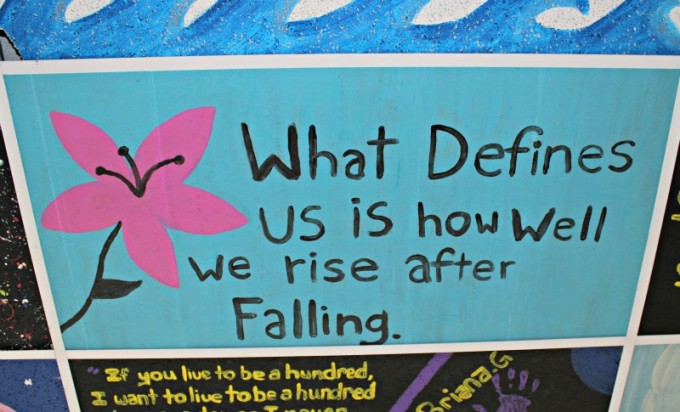Sibling Support Program: A Family-Centered Mental Health Initiative
Emily Rubin is a Program Associate for the Child and Adolescent Inpatient Mental Health Program at Franciscan. Her primary role is at UMass Medical School, as Director of Sibling Support and Lecturer in Psychiatry. We are thrilled to partner with Emily as she oversees the Sibling Support Program: A Family-Centered Mental Health Initiative. For more information, please contact Emily at 774-455-6537 or emily.rubin@umassmed.edu.

Inspirational artwork pictured created by a patient in our Inpatient Mental Health Program.
Thursday nights at Franciscan are a time of learning and healing for families of children admitted to the Child and Adolescent Inpatient Mental Health Program, thanks to a new partnership between UMass Medical School and Franciscan Hospital for Children.
The Child and Adolescent Inpatient Mental Health Program (often referred to as Unit 1) unites the strengths of a premier mental health provider, McLean Hospital, with a nationally recognized leader in pediatric rehabilitation and special education, Franciscan Hospital for Children. It is a place for hope and recovery for children in psychiatric crisis, offering expert crisis stabilization, assessment, and inpatient mental health treatment in a safe and nurturing environment.
When a child is in psychiatric crisis, it affects every member of the family. Parents and caregivers often feel overwhelmed, deeply discouraged, and sometimes ashamed when a child’s behavioral needs require inpatient treatment. Many of their siblings have been exposed to physical and verbal aggression, and the sibling relationship can be confusing and scary.
I developed the Sibling Support Program: A Family-Centered Mental Health Initiative at the Eunice Kennedy Shriver Center of UMass Medical School to address the complex needs of families during a child’s psychiatric crisis. The goals of the program are to:
- Increase sibling resiliency and mitigate the trauma commonly experienced by siblings of children and adolescents during psychiatric hospitalization
- Build skills, competency and confidence among parents
- Help restore family stability once the hospitalized patient returns home, minimizing rates of re-hospitalization
- Build capacity among medical practitioners, thereby influencing the delivery of family-centered mental health care
As part of the program at Franciscan, all parents of children and adolescents admitted to Unit 1 receive a phone call with a personal invitation to participate from a trained parent mentor who shares the experience of raising a child with mental health issues. For many parents, getting that phone call from the parent mentor – who has firsthand experience of how a child’s mental health problems impact the entire family – is a powerful moment of feeling understood.
When families arrive at Franciscan on Thursday nights, parents and caregivers gather in a conference room to learn about the impact of mental illness on siblings, strategies to support siblings, and resources for siblings.
In a nearby room, siblings participate in activities which enable them to safely share their stories and hear the stories of other siblings. Through these activities, the siblings realize they are not alone, and that caring adults are available to help them process their feelings. They are also introduced to a range of coping skills, including how to manage difficult situations with their brothers and sisters.
Friendships frequently bloom among participating siblings, as well as parents, since they have an unspoken understanding of the challenges the families have faced. They have each endured emotional events leading up to the psychiatric hospitalization such as a child’s suicidality, psychotic breaks, threats of harming others, and running away.
Reception to the program among families and clinicians has been extremely positive: most parents report feeling “hopeless” or “discouraged” before participating in the program, and feeling “hopeful” and “less stressed” after participating. We see the same trend in siblings: they often report feeling scared or sad before participation, and following participation they feel happy and relieved. The majority of parents and siblings report they would recommend the groups to others.
While the sibling groups and parent groups have been shown to be an important source of support and information for participants, the groups also help to build trust between families and their treatment teams.
Furthermore, the groups are contributing to the education of psychology trainees, who report they are developing a better understanding of family-centered mental health care as a result of facilitating the sibling groups. Ashley Cameron and Lisa Rines-Toth, two doctoral students in psychology, co-lead the sibling group at Franciscan under the supervision of clinical psychologist Dr. Kristina Ten Haagen.
Close to 100 siblings and parents have participated in the Sibling Support Program at Franciscan since December 2015. The program has been implemented at other inpatient psychiatry units in the Boston area, and has served over 1000 participants to date. Post-hospitalization services for the Sibling Support Program are pending funding.
For more information and insights, please check out this news clip from WBZ-TV, featuring the Sibling Support Program in a story that aired in December 2015.
View All Blog Stories